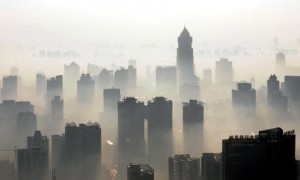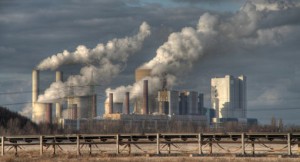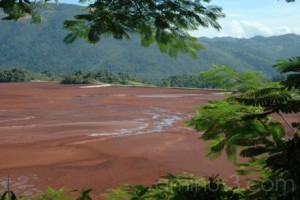
Something in the Air
June 30th, 2015
“I think it’s the air.”
So said a friend, seeking to console me as I complained about my ongoing ill health (regular bouts of coughing, etc. – I will spare you the boring details). She got me thinking. I learned recently that air quality – air pollution – is now the world’s largest single environmental health risk.
We have seen the photos of Beijing residents, ghostly shapes looming in a fog of fossil fuel pollution, and the fake “dawns” on days when they cannot actually see the sun rise. Beijing may be an extreme example. Outdoor air pollution is a major environmental health problem that affects both “First World” and “Third World” countries, says the World Health Organization (WHO), and not just in cities either. In 2012, air pollution in both urban and rural areas caused millions of premature deaths – most of which occurred in less developed countries.

An aerial view of buildings amid the haze of pollution engulfing Wuhan, in central China’s Hubei province. Photograph: STR/AFP/Getty Images
Are there any recent studies on the effect of air pollution on Jamaicans’ health? Is there now regular measuring and monitoring of air quality, especially in Kingston? The other day, I opened our front door and quickly closed it again. The smell of burning in the air was overwhelming. One wonders what the longterm impact of bush fires, exacerbated by high temperatures and strong winds, will be.
The primary culprit in global air pollution is particulate matter. I think many of us became familiar with this term during the frightful fires at Riverton City, which have become a recurring event. The WHO notes that there is no level at which this pollution is not harmful to your health. In other words, breathing in any of these chemicals (take your pick from sulfate, nitrates, ammonia, sodium chloride, black carbon and mineral dust, or combinations of any) in even the tiniest amounts will harm you.

Coal-fired power plants may be obsolete in the next decade or two, but Jamaica wants to forge ahead with building new ones. Did you know also that these plants consume huge quantities of that precious resource, water?
Yet we seem to be quite OK with commissioning coal-fired power plants, on our beautiful island with its delicious sea breezes and cool mountain air. Coal-fired plants emit sulfur dioxide, nitrogen oxide, the aforementioned particulate matter, carbon monoxide and arsenic. Let’s not forget those lovely heavy metals, either: mercury, lead, cadmium and more. What are we doing? Are we at all serious about climate change?
Think about it: quite simply, on a personal level, are we quite happy to take these poisons into our lungs? They are the only two lungs we have; and we also have only one heart to serve us through life. We know that air pollution causes not only asthma and lung disease, but also heart disease, strokes and cancer. How many Jamaicans do you know who are asthmatic? I know quite a few. What effect does this have on productivity and lost working hours? We know the cost to our health sector.
On television last night, a group of angry residents protested, not for the first time, about bauxite dust. They happen to live near one of the notorious red lakes, apparently a permanent fixture in our rural landscapes, left behind by the mining. Due to the changing climate (one suspects) – increasingly strong winds and higher temperatures over an extended period – the lake has come alive, with plumes of poisonous chemicals whipped up into the air. A representative of the mining company (who seemed reluctant to get out of his car) sympathized deeply with the residents, but said the company was unable to do anything to help. The bauxite plant is not even open, after all. This is simply an after-effect, a legacy.
Air quality is very much a local as well as a national or global concern. It is not an abstract concept; it is something that affects many of us personally. As I sat in the nebulizer room at our local hospital recently, puffing small misty clouds from my mask, I imagined the human race of the future. Each home will come equipped with its own nebulizer machine. People will not actually go outside any more, but live in sealed homes, possibly underground.
Could this really be our future, without clean air to breathe? Watching one rural Jamaican resident disappear into a swirl of acid orange dust on the television news, I reflected that without good air and clean water to drink, life is simply unlivable. The impact on society is unfathomable, at this point.
So what can we do at a personal level? We must try our hardest not to make matters worse. We should not be burning our garbage (it’s illegal, anyway). Forget “slash and burn” on agricultural land, or anywhere else. Let’s service our vehicles regularly. Let us also be very, very careful about the chemicals we use, often too carelessly, in and around the home; those insecticide sprays for example, and mosquito repellents, and fertilizers. We can find natural or home-made substitutes, very often.
We should also keep our priorities straight. As the well-known Native American proverb goes, “Only when the last tree is cut down, and the last river poisoned and the last fish eaten, we will realize we cannot eat money.”
We must find a way to breathe easy, or our future is at stake.

This is what a nebulizer looks like. In the past several years, asthma cases in Jamaica among children and adults have risen steadily.
Tags: air quality, asthma, bauxite mining, China, coal, coal-fired power plant, disease, particulate matter, pollution, Riverton City, WHO, World Health Organization
The Gleaner reserves the right not to publish comments that may be deemed libelous, derogatory or indecent.
To respond to The Gleaner please use the feedback form.
2 Responses to “Something in the Air”
- We Are the Zoomers
- Living Online with Humans and Birds: NAOC 2020
- Human Trafficking and the Problem of Public Education
- Down Memory Lane
- Are We Ready to Recover from COVID-19?
- Road Safety Matters: Is Your Vehicle Safe?
- Sexual Harassment, Me Too, and the Minister’s Disturbing Giggle
- The Vulnerable Senior Citizens, Private Care Homes and COVID-19
- A Muddle Over Masks
- Here is Something Life-Saving You Can Do: Give Blood!




Wouldlike to know the reporters name of the article. A brillant and true article. We cannot eat money when we destroy all life sustaining environment.
Thank you so much for your comments! I am the writer of the article. Sometimes a quote like this can really make you stop and think, can’t it?